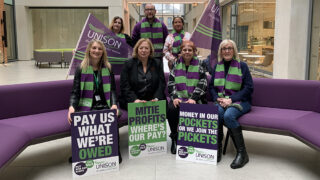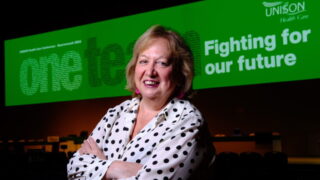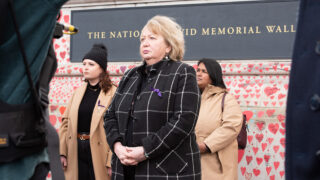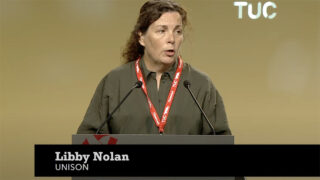The demand for a full public inquiry into the Westminster government’s handling of the COVID pandemic was at the heart of a key debate The impact of COVID-19 on UNISON members, public services and working life at UNISON’s special delegate conference yesterday.
Margaret McKee (pictured above), moving a motion for the national executive council, told delegates why it was so important: “That government’s failures over the provision of personal protective equipment (PPE) at the very beginning of the pandemic – and conference, that inquiry must also cover how those contracts were awarded – to the disaster that was test and trace, has led the UK to having some of the worst statistics in the world.
“From the second highest number of deaths amongst developed countries, to the disproportionate impact on the Black community … failures compounded by 10 years of austerity and its impact on our public services.”
“A key lesson of the pandemic is that continued public service cuts and more aggressive employers means it has never been more important to be a member of UNISON, if you work in public services. We must make our union visible in the workplace – if we are visible, workers will join us. If we are visible, members will stay with us.
“As chair of the international committee I want to underline the global impact of the pandemic that has touched every country in the world. From the global race to find PPE at the beginning, to the glaring inequality with regard to access to vaccines that we are witnessing now, this pandemic has exposed the failures of the neoliberal economic model.”
Ms McKee added: “We have to say the response of the G7 summit this weekend was woefully inadequate. And I want to recognise the leadership UNISON and Christina McAnea has shown on global vaccination equality.”
Commenting on an amendment around the government’s proposed policing legislation, she described it as being “clearly a bad bill, and we must do everything we can to oppose it.
“But we should also note that there are elements of it that we don’t oppose and includes, for example, measures that will increase the penalty for those who assault our emergency workers.
“The NEC’s qualification is to recognise this and to express our hope that this and other aspects of the bill, such as mandatory life terms for the premeditated murder of children, come back in future legislation.”
‘Unprecedented attacks’
For the national disabled members’ committee, Elizabeth Cameron told delegates that the pandemic “has been a dramatic experience for disabled members of our union. We’ve seen unprecedented attacks on our independence and our rights.”
She said that, when having to shield, many lost a large part of their income, which forced them into debt and in turn, created additional stress and mental health problems.
Ms Cameron called on the NEC to campaign for the incorporation of the United Nations Convention on the Rights of Persons with Disabilities (UNCRPD) into UK and devolved nations’ law, so that disabled people’s rights are never again ignored.”
Deborah Yapicioz from Northern Ireland noted that: “UNISON members across public services have been at the forefront of fighting the virus,” and says that any public inquiry into the pandemic must give the chance for “our members’ voices to be heard”.
Steve Bell from Bucks Health Branch stressed the need for any inquiry to be genuinely independent, while Lola Oyewusi, on behalf of the national Black members’ committee, told conference that it was “sad that there’s not enough leadership or guidance from this government” around racism and “this government is not showing that it will ever do anything about it”.
Sanchia Alasia from London Southbank University noted that: “Many people in the pandemic have had to cope with the loss of income,” and highlighted “the link between deprivation and COVID-19 death rates.”

Carol Sewell (pictured above) from the NEC pointed out that 15 months on since the first lockdown, it was “an absolute disgrace” that “Black unemployment rose by 41%” during the pandemic, as opposed to 14% among white people”.
The motion set out a comprehensive body of work for the NEC to undertake around the issues, including to:
- campaign for companies and the public sector to act to prevent abuse to people and the planet or face meaningful consequences;
- demand that any public inquiry’s terms of reference include a full investigation into the market engagement, procurement and contract management practices applied to the sourcing of high-risk products compared to the UK’s international obligations;
- campaign to waive intellectual property rights on COVID-19 vaccines to allow all countries to be able to access them.
Moving a related motion for the national women’s committee, Tansaim Hussain-Gul told delegates that domestic abuse has flourished in the pandemic – with a rise of almost 50% in calls to domestic abuse lines.
Yet “barriers to support are increasing”, with refuge places in the first months of the pandemic reduced by 40%.
“Until we have a strong network of refuges, we will see more women dying,” was her stark warning.
Conference called on the NEC to lobby all UK governments to create long-term funding solutions to tackle the issue.






